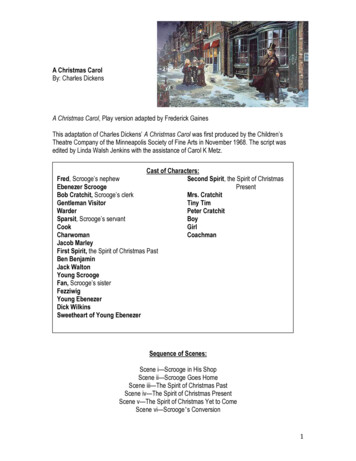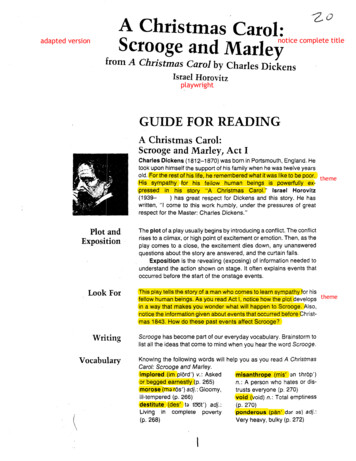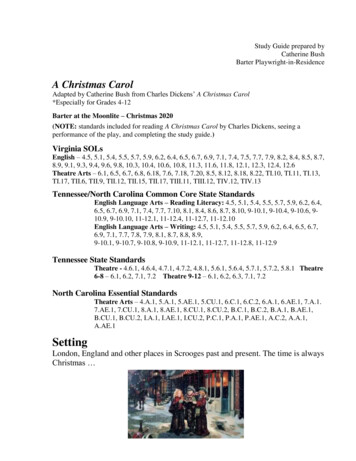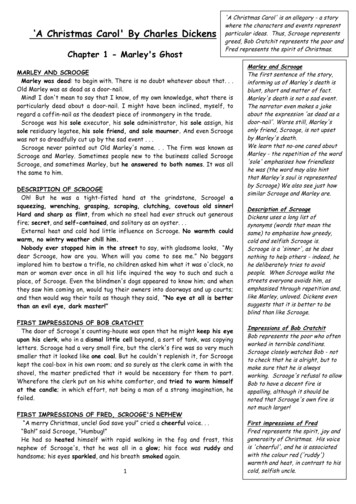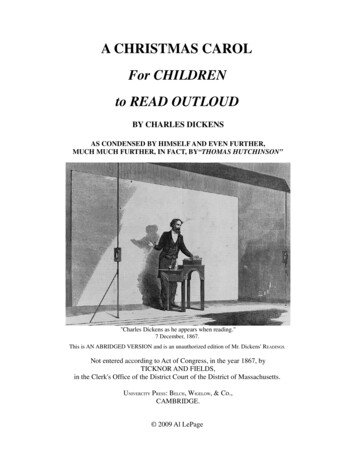
Transcription
Hard Times by Charles DickensBOOK THE FIRST - SOWINGCHAPTER I - THE ONE THING NEEDFUL'NOW, what I want is, Facts.but Facts.Teach these boys and girls nothingFacts alone are wanted in life.and root out everything else.reasoning animals upon Facts:service to them.Plant nothing else,You can only form the minds ofnothing else will ever be of anyThis is the principle on which I bring up my ownchildren, and this is the principle on which I bring up thesechildren. Stick to Facts, sir!'The scene was a plain, bare, monotonous vault of a school-room, andthe speaker's square forefinger emphasized his observations byunderscoring every sentence with a line on the schoolmaster'ssleeve.The emphasis was helped by the speaker's square wall of aforehead, which had his eyebrows for its base, while his eyes foundcommodious cellarage in two dark caves, overshadowed by the wall.The emphasis was helped by the speaker's mouth, which was wide,thin, and hard set.The emphasis was helped by the speaker'svoice, which was inflexible, dry, and dictatorial.The emphasiswas helped by the speaker's hair, which bristled on the skirts ofhis bald head, a plantation of firs to keep the wind from itsshining surface, all covered with knobs, like the crust of a plumpie, as if the head had scarcely warehouse-room for the hard factsstored inside.The speaker's obstinate carriage, square coat,square legs, square shoulders, - nay, his very neckcloth, trainedto take him by the throat with an unaccommodating grasp, like a
stubborn fact, as it was, - all helped the emphasis.'In this life, we want nothing but Facts, sir; nothing but Facts!'The speaker, and the schoolmaster, and the third grown personpresent, all backed a little, and swept with their eyes theinclined plane of little vessels then and there arranged in order,ready to have imperial gallons of facts poured into them until theywere full to the brim.CHAPTER II - MURDERING THE INNOCENTSTHOMAS GRADGRIND, sir.A man of realities. A man of facts andcalculations. A man who proceeds upon the principle that two andtwo are four, and nothing over, and who is not to be talked intoallowing for anything over.Thomas - Thomas Gradgrind.Thomas Gradgrind, sir - peremptorilyWith a rule and a pair of scales, andthe multiplication table always in his pocket, sir, ready to weighand measure any parcel of human nature, and tell you exactly whatit comes to.It is a mere question of figures, a case of simplearithmetic. You might hope to get some other nonsensical beliefinto the head of George Gradgrind, or Augustus Gradgrind, or JohnGradgrind, or Joseph Gradgrind (all supposititious, non-existentpersons), but into the head of Thomas Gradgrind - no, sir!In such terms Mr. Gradgrind always mentally introduced himself,whether to his private circle of acquaintance, or to the public ingeneral.In such terms, no doubt, substituting the words 'boys andgirls,' for 'sir,' Thomas Gradgrind now presented Thomas Gradgrindto the little pitchers before him, who were to be filled so full offacts.
Indeed, as he eagerly sparkled at them from the cellarage beforementioned, he seemed a kind of cannon loaded to the muzzle withfacts, and prepared to blow them clean out of the regions ofchildhood at one discharge. He seemed a galvanizing apparatus,too, charged with a grim mechanical substitute for the tender youngimaginations that were to be stormed away.'Girl number twenty,' said Mr. Gradgrind, squarely pointing withhis square forefinger, 'I don't know that girl.Who is that girl?''Sissy Jupe, sir,' explained number twenty, blushing, standing up,and curtseying.'Sissy is not a name,' said Mr. Gradgrind.Sissy.'Don't call yourselfCall yourself Cecilia.''It's father as calls me Sissy, sir,' returned the young girl in atrembling voice, and with another curtsey.'Then he has no business to do it,' said Mr. Gradgrind.he mustn't.Cecilia Jupe. Let me see.'Tell himWhat is your father?''He belongs to the horse-riding, if you please, sir.'Mr. Gradgrind frowned, and waved off the objectionable calling withhis hand.'We don't want to know anything about that, here.us about that, here.You mustn't tellYour father breaks horses, don't he?''If you please, sir, when they can get any to break, they do breakhorses in the ring, sir.''You mustn't tell us about the ring, here. Very well, then.Describe your father as a horsebreaker.dare say?'He doctors sick horses, I
'Oh yes, sir.''Very well, then.horsebreaker.He is a veterinary surgeon, a farrier, andGive me your definition of a horse.'(Sissy Jupe thrown into the greatest alarm by this demand.)'Girl number twenty unable to define a horse!' said Mr. Gradgrind,for the general behoof of all the little pitchers.'Girl numbertwenty possessed of no facts, in reference to one of the commonestof animals!Some boy's definition of a horse.Bitzer, yours.'The square finger, moving here and there, lighted suddenly onBitzer, perhaps because he chanced to sit in the same ray ofsunlight which, darting in at one of the bare windows of theintensely white-washed room, irradiated Sissy.For, the boys andgirls sat on the face of the inclined plane in two compact bodies,divided up the centre by a narrow interval; and Sissy, being at thecorner of a row on the sunny side, came in for the beginning of asunbeam, of which Bitzer, being at the corner of a row on the otherside, a few rows in advance, caught the end.But, whereas the girlwas so dark-eyed and dark-haired, that she seemed to receive adeeper and more lustrous colour from the sun, when it shone uponher, the boy was so light-eyed and light-haired that the self-samerays appeared to draw out of him what little colour he everpossessed. His cold eyes would hardly have been eyes, but for theshort ends of lashes which, by bringing them into immediatecontrast with something paler than themselves, expressed theirform.His short-cropped hair might have been a mere continuationof the sandy freckles on his forehead and face.His skin was sounwholesomely deficient in the natural tinge, that he looked asthough, if he were cut, he would bleed white.'Bitzer,' said Thomas Gradgrind.'Your definition of a horse.'
'Quadruped. Graminivorous.Forty teeth, namely twenty-fourgrinders, four eye-teeth, and twelve incisive.Sheds coat in thespring; in marshy countries, sheds hoofs, too.Hoofs hard, butrequiring to be shod with iron. Age known by marks in mouth.'Thus (and much more) Bitzer.'Now girl number twenty,' said Mr. Gradgrind.'You know what ahorse is.'She curtseyed again, and would have blushed deeper, if she couldhave blushed deeper than she had blushed all this time.Bitzer,after rapidly blinking at Thomas Gradgrind with both eyes at once,and so catching the light upon his quivering ends of lashes thatthey looked like the antennae of busy insects, put his knuckles tohis freckled forehead, and sat down again.The third gentleman now stepped forth. A mighty man at cutting anddrying, he was; a government officer; in his way (and in most otherpeople's too), a professed pugilist; always in training, alwayswith a system to force down the general throat like a bolus, alwaysto be heard of at the bar of his little Public-office, ready tofight all England. To continue in fistic phraseology, he had agenius for coming up to the scratch, wherever and whatever it was,and proving himself an ugly customer.He would go in and damageany subject whatever with his right, follow up with his left, stop,exchange, counter, bore his opponent (he always fought All England)to the ropes, and fall upon him neatly.He was certain to knockthe wind out of common sense, and render that unlucky adversarydeaf to the call of time.And he had it in charge from highauthority to bring about the great public-office Millennium, whenCommissioners should reign upon earth.'Very well,' said this gentleman, briskly smiling, and folding hisarms.'That's a horse.Now, let me ask you girls and boys, Wouldyou paper a room with representations of horses?'
After a pause, one half of the children cried in chorus, 'Yes,sir!' Upon which the other half, seeing in the gentleman's facethat Yes was wrong, cried out in chorus, 'No, sir!' - as the customis, in these examinations.'Of course, No.A pause.Why wouldn't you?'One corpulent slow boy, with a wheezy manner ofbreathing, ventured the answer, Because he wouldn't paper a room atall, but would paint it.'You must paper it,' said the gentleman, rather warmly.'You must paper it,' said Thomas Gradgrind, 'whether you like it ornot. Don't tell us you wouldn't paper it. What do you mean, boy?''I'll explain to you, then,' said the gentleman, after another anda dismal pause, 'why you wouldn't paper a room with representationsof horses.Do you ever see horses walking up and down the sides ofrooms in reality - in fact?'Yes, sir!' from one half.Do you?''No, sir!' from the other.'Of course no,' said the gentleman, with an indignant look at thewrong half.'Why, then, you are not to see anywhere, what youdon't see in fact; you are not to have anywhere, what you don'thave in fact. What is called Taste, is only another name forFact.' Thomas Gradgrind nodded his approbation.'This is a new principle, a discovery, a great discovery,' said thegentleman.'Now, I'll try you again.carpet a room.Suppose you were going toWould you use a carpet having a representation offlowers upon it?'There being a general conviction by this time that 'No, sir!' wasalways the right answer to this gentleman, the chorus of NO was
very strong. Only a few feeble stragglers said Yes:among themSissy Jupe.'Girl number twenty,' said the gentleman, smiling in the calmstrength of knowledge.Sissy blushed, and stood up.'So you would carpet your room - or your husband's room, if youwere a grown woman, and had a husband - with representations offlowers, would you?' said the gentleman.'Why would you?''If you please, sir, I am very fond of flowers,' returned the girl.'And is that why you would put tables and chairs upon them, andhave people walking over them with heavy boots?''It wouldn't hurt them, sir.you please, sir.They wouldn't crush and wither, ifThey would be the pictures of what was verypretty and pleasant, and I would fancy - ''Ay, ay, ay!But you mustn't fancy,' cried the gentleman, quiteelated by coming so happily to his point.'That's it!You arenever to fancy.''You are not, Cecilia Jupe,' Thomas Gradgrind solemnly repeated,'to do anything of that kind.''Fact, fact, fact!' said the gentleman.And 'Fact, fact, fact!'repeated Thomas Gradgrind.'You are to be in all things regulated and governed,' said thegentleman, 'by fact.We hope to have, before long, a board offact, composed of commissioners of fact, who will force the peopleto be a people of fact, and of nothing but fact.You must discardthe word Fancy altogether. You have nothing to do with it.You
are not to have, in any object of use or ornament, what would be acontradiction in fact.You don't walk upon flowers in fact; youcannot be allowed to walk upon flowers in carpets.You don't findthat foreign birds and butterflies come and perch upon yourcrockery; you cannot be permitted to paint foreign birds andbutterflies upon your crockery.You never meet with quadrupedsgoing up and down walls; you must not have quadrupeds representedupon walls. You must use,' said the gentleman, 'for all thesepurposes, combinations and modifications (in primary colours) ofmathematical figures which are susceptible of proof anddemonstration.This is the new discovery.This is fact.This istaste.'The girl curtseyed, and sat down.She was very young, and shelooked as if she were frightened by the matter-of-fact prospect theworld afforded.'Now, if Mr. M'Choakumchild,' said the gentleman, 'will proceed togive his first lesson here, Mr. Gradgrind, I shall be happy, atyour request, to observe his mode of procedure.'Mr. Gradgrind was much obliged.'Mr. M'Choakumchild, we only waitfor you.'So, Mr. M'Choakumchild began in his best manner.He and some onehundred and forty other schoolmasters, had been lately turned atthe same time, in the same factory, on the same principles, like somany pianoforte legs.He had been put through an immense varietyof paces, and had answered volumes of head-breaking questions.Orthography, etymology, syntax, and prosody, biography, astronomy,geography, and general cosmography, the sciences of compoundproportion, algebra, land-surveying and levelling, vocal music, anddrawing from models, were all at the ends of his ten chilledfingers.He had worked his stony way into Her Majesty's mostHonourable Privy Council's Schedule B, and had taken the bloom offthe higher branches of mathematics and physical science, French,
German, Latin, and Greek.He knew all about all the Water Sheds ofall the world (whatever they are), and all the histories of all thepeoples, and all the names of all the rivers and mountains, and allthe productions, manners, and customs of all the countries, and alltheir boundaries and bearings on the two and thirty points of thecompass.Ah, rather overdone, M'Choakumchild.If he had onlylearnt a little less, how infinitely better he might have taughtmuch more!He went to work in this preparatory lesson, not unlike Morgiana inthe Forty Thieves: looking into all the vessels ranged before him,one after another, to see what they contained.M'Choakumchild.Say, goodWhen from thy boiling store, thou shalt fill eachjar brim full by-and-by, dost thou think that thou wilt always killoutright the robber Fancy lurking within - or sometimes only maimhim and distort him!CHAPTER III - A LOOPHOLEMR. GRADGRIND walked homeward from the school, in a state ofconsiderable satisfaction.to be a model.It was his school, and he intended itHe intended every child in it to be a model - justas the young Gradgrinds were all models.There were five young Gradgrinds, and they were models every one.They had been lectured at, from their tenderest years; coursed,like little hares.Almost as soon as they could run alone, theyhad been made to run to the lecture-room.The first object withwhich they had an association, or of which they had a remembrance,was a large black board with a dry Ogre chalking ghastly whitefigures on it.
Not that they knew, by name or nature, anything about an Ogre Factforbid! I only use the word to express a monster in a lecturingcastle, with Heaven knows how many heads manipulated into one,taking childhood captive, and dragging it into gloomy statisticaldens by the hair.No little Gradgrind had ever seen a face in the moon; it was up inthe moon before it could speak distinctly. No little Gradgrind hadever learnt the silly jingle, Twinkle, twinkle, little star; how Iwonder what you are!No little Gradgrind had ever known wonder onthe subject, each little Gradgrind having at five years olddissected the Great Bear like a Professor Owen, and drivenCharles's Wain like a locomotive engine-driver.No littleGradgrind had ever associated a cow in a field with that famous cowwith the crumpled horn who tossed the dog who worried the cat whokilled the rat who ate the malt, or with that yet more famous cowwho swallowed Tom Thumb:it had never heard of those celebrities,and had only been introduced to a cow as a graminivorous ruminatingquadruped with several stomachs.To his matter-of-fact home, which was called Stone Lodge, Mr.Gradgrind directed his steps.He had virtually retired from thewholesale hardware trade before he built Stone Lodge, and was nowlooking about for a suitable opportunity of making an arithmeticalfigure in Parliament.Stone Lodge was situated on a moor within amile or two of a great town - called Coketown in the presentfaithful guide-book.A very regular feature on the face of the country, Stone Lodge was.Not the least disguise toned down or shaded off that uncompromisingfact in the landscape. A great square house, with a heavy porticodarkening the principal windows, as its master's heavy browsovershadowed his eyes.house.A calculated, cast up, balanced, and provedSix windows on this side of the door, six on that side; atotal of twelve in this wing, a total of twelve in the other wing;four-and-twenty carried over to the back wings.A lawn and garden
and an infant avenue, all ruled straight like a botanical accountbook.Gas and ventilation, drainage and water-service, all of theprimest quality.Iron clamps and girders, fire-proof from top tobottom; mechanical lifts for the housemaids, with all their brushesand brooms; everything that heart could desire.Everything?Well, I suppose so.The little Gradgrinds hadcabinets in various departments of science too.They had a littleconchological cabinet, and a little metallurgical cabinet, and alittle mineralogical cabinet; and the specimens were all arrangedand labelled, and the bits of stone and ore looked as though theymight have been broken from the parent substances by thosetremendously hard instruments their own names; and, to paraphrasethe idle legend of Peter Piper, who had never found his way intotheir nursery, If the greedy little Gradgrinds grasped at more thanthis, what was it for good gracious goodness' sake, that the greedylittle Gradgrinds grasped it!Their father walked on in a hopeful and satisfied frame of mind.He was an affectionate father, after his manner; but he wouldprobably have described himself (if he had been put, like SissyJupe, upon a definition) as 'an eminently practical' father.Hehad a particular pride in the phrase eminently practical, which wasconsidered to have a special application to him.Whatsoever thepublic meeting held in Coketown, and whatsoever the subject of suchmeeting, some Coketowner was sure to seize the occasion of alludingto his eminently practical friend Gradgrind.the eminently practical friend.This always pleasedHe knew it to be his due, but hisdue was acceptable.He had reached the neutral ground upon the outskirts of the town,which was neither town nor country, and yet was either spoiled,when his ears were invaded by the sound of music.The clashing andbanging band attached to the horse-riding establishment, which hadthere set up its rest in a wooden pavilion, was in full bray.Aflag, floating from the summit of the temple, proclaimed to mankind
that it was 'Sleary's Horse-riding' which claimed their suffrages.Sleary himself, a stout modern statue with a money-box at itselbow, in an ecclesiastical niche of early Gothic architecture,took the money.Miss Josephine Sleary, as some very long and verynarrow strips of printed bill announced, was then inaugurating theentertainments with her graceful equestrian Tyrolean flower-act.Among the other pleasing but always strictly moral wonders whichmust be seen to be believed, Signor Jupe was that afternoon to'elucidate the diverting accomplishments of his highly trainedperforming dog Merrylegs.' He was also to exhibit 'his astoundingfeat of throwing seventy-five hundred-weight in rapid successionbackhanded over his head, thus forming a fountain of solid iron inmid-air, a feat never before attempted in this or any othercountry, and which having elicited such rapturous plaudits fromenthusiastic throngs it cannot be withdrawn.' The same Signor Jupewas to 'enliven the varied performances at frequent intervals withhis chaste Shaksperean quips and retorts.' Lastly, he was to windthem up by appearing in his favourite character of Mr. WilliamButton, of Tooley Street, in 'the highly novel and laughable hippocomedietta of The Tailor's Journey to Brentford.'Thomas Gradgrind took no heed of these trivialities of course, butpassed on as a practical man ought to pass on, either brushing thenoisy insects from his thoughts, or consigning them to the House ofCorrection. But, the turning of the road took him by the back ofthe booth, and at the back of the booth a number of children werecongregated in a number of stealthy attitudes, striving to peep inat the hidden glories of the place.This brought him to a stop.'Now, to think of these vagabonds,'said he, 'attracting the young rabble from a model school.'A space of stunted grass and dry rubbish being between him and theyoung rabble, he took his eyeglass out of his waistcoat to look forany child he knew by name, and might order off.Phenomenon almostincredible though distinctly seen, what did he then behold but his
own metallurgical Louisa, peeping with all her might through a holein a deal board, and his own mathematical Thomas abasing himself onthe ground to catch but a hoof of the graceful equestrian Tyroleanflower-act!Dumb with amazement, Mr. Gradgrind crossed to the spot where hisfamily was thus disgraced, laid his hand upon each erring child,and said:'Louisa!!Thomas!!'Both rose, red and disconcerted. But, Louisa looked at her fatherwith more boldness than Thomas did.Indeed, Thomas did not look athim, but gave himself up to be taken home like a machine.'In the name of wonder, idleness, and folly!' said Mr. Gradgrind,leading each away by a hand; 'what do you do here?''Wanted to see what it was like,' returned Louisa, shortly.'What it was like?''Yes, father.'There was an air of jaded sullenness in them both, and particularlyin the girl:yet, struggling through the dissatisfaction of herface, there was a light with nothing to rest upon, a fire withnothing to burn, a starved imagination keeping life in itselfsomehow, which brightened its expression.Not with the brightnessnatural to cheerful youth, but with uncertain, eager, doubtfulflashes, which had something painful in them, analogous to thechanges on a blind face groping its way.She was a child now, of fifteen or sixteen; but at no distant daywould seem to become a woman all at once.he looked at her.She was pretty.Her father thought so asWould have been self-willed (he
thought in his eminently practical way) but for her bringing-up.'Thomas, though I have the fact before me, I find it difficult tobelieve that you, with your education and resources, should havebrought your sister to a scene like this.''I brought him, father,' said Louisa, quickly.'I asked him tocome.''I am sorry to hear it.I am very sorry indeed to hear it.Itmakes Thomas no better, and it makes you worse, Louisa.'She looked at her father again, but no tear fell down her cheek.'You!Thomas and you, to whom the circle of the sciences is open;Thomas and you, who may be said to be replete with facts; Thomasand you, who have been trained to mathematical exactness; Thomasand you, here!' cried Mr. Gradgrind.'In this degraded position!I am amazed.''I was tired, father.'Tired?I have been tired a long time,' said Louisa.Of what?' asked the astonished father.'I don't know of what - of everything, I think.''Say not another word,' returned Mr. Gradgrind.'You are childish.I will hear no more.' He did not speak again until they had walkedsome half-a-mile in silence, when he gravely broke out with:would your best friends say, Louisa?their good opinion?'WhatDo you attach no value toWhat would Mr. Bounderby say?' At the mentionof this name, his daughter stole a look at him, remarkable for itsintense and searching character.He saw nothing of it, for beforehe looked at her, she had again cast down her eyes!'What,' he repeated presently, 'would Mr. Bounderby say?' All the
way to Stone Lodge, as with grave indignation he led the twodelinquents home, he repeated at intervals 'What would Mr.Bounderby say?' - as if Mr. Bounderby had been Mrs. Grundy.CHAPTER IV - MR. BOUNDERBYNOT being Mrs. Grundy, who was Mr. Bounderby?Why, Mr. Bounderby was as near being Mr. Gradgrind's bosom friend,as a man perfectly devoid of sentiment can approach that spiritualrelationship towards another man perfectly devoid of sentiment.Sonear was Mr. Bounderby - or, if the reader should prefer it, so faroff.He was a rich man:banker, merchant, manufacturer, and what not.A big, loud man, with a stare, and a metallic laugh. A man madeout of a coarse material, which seemed to have been stretched tomake so much of him.A man with a great puffed head and forehead,swelled veins in his temples, and such a strained skin to his facethat it seemed to hold his eyes open, and lift his eyebrows up. Aman with a pervading appearance on him of being inflated like aballoon, and ready to start. A man who could never sufficientlyvaunt himself a self-made man. A man who was always proclaiming,through that brassy speaking-trumpet of a voice of his, his oldignorance and his old poverty.A man who was the Bully ofhumility.A year or two younger than his eminently practical friend, Mr.Bounderby looked older; his seven or eight and forty might have hadthe seven or eight added to it again, without surprising anybody.He had not much hair.One might have fancied he had talked it off;and that what was left, all standing up in disorder, was in that
condition from being constantly blown about by his windyboastfulness.In the formal drawing-room of Stone Lodge, standing on thehearthrug, warming himself before the fire, Mr. Bounderby deliveredsome observations to Mrs. Gradgrind on the circumstance of itsbeing his birthday.He stood before the fire, partly because itwas a cool spring afternoon, though the sun shone; partly becausethe shade of Stone Lodge was always haunted by the ghost of dampmortar; partly because he thus took up a commanding position, fromwhich to subdue Mrs. Gradgrind.'I hadn't a shoe to my foot. As to a stocking, I didn't know sucha thing by name.pigsty.I passed the day in a ditch, and the night in aThat's the way I spent my tenth birthday.Not that aditch was new to me, for I was born in a ditch.'Mrs. Gradgrind, a little, thin, white, pink-eyed bundle of shawls,of surpassing feebleness, mental and bodily; who was always takingphysic without any effect, and who, whenever she showed a symptomof coming to life, was invariably stunned by some weighty piece offact tumbling on her; Mrs. Gradgrind hoped it was a dry ditch?'No!As wet as a sop. A foot of water in it,' said Mr. Bounderby.'Enough to give a baby cold,' Mrs. Gradgrind considered.'Cold?I was born with inflammation of the lungs, and ofeverything else, I believe, that was capable of inflammation,'returned Mr. Bounderby.'For years, ma'am, I was one of the mostmiserable little wretches ever seen.always moaning and groaning.I was so sickly, that I wasI was so ragged and dirty, that youwouldn't have touched me with a pair of tongs.'Mrs. Gradgrind faintly looked at the tongs, as the most appropriatething her imbecility could think of doing.
'How I fought through it, I don't know,' said Bounderby.determined, I suppose.'I wasI have been a determined character in laterlife, and I suppose I was then.Here I am, Mrs. Gradgrind, anyhow,and nobody to thank for my being here, but myself.'Mrs. Gradgrind meekly and weakly hoped that his mother -'My mother?Bolted, ma'am!' said Bounderby.Mrs. Gradgrind, stunned as usual, collapsed and gave it up.'My mother left me to my grandmother,' said Bounderby; 'and,according to the best of my remembrance, my grandmother was thewickedest and the worst old woman that ever lived.If I got alittle pair of shoes by any chance, she would take 'em off and sell'em for drink.Why, I have known that grandmother of mine lie inher bed and drink her four-teen glasses of liquor beforebreakfast!'Mrs. Gradgrind, weakly smiling, and giving no other sign ofvitality, looked (as she always did) like an indifferently executedtransparency of a small female figure, without enough light behindit.'She kept a chandler's shop,' pursued Bounderby, 'and kept me in anegg-box.That was the cot of my infancy; an old egg-box. As soonas I was big enough to run away, of course I ran away. Then Ibecame a young vagabond; and instead of one old woman knocking meabout and starving me, everybody of all ages knocked me about andstarved me.else.They were right; they had no business to do anythingI was a nuisance, an incumbrance, and a pest.I know thatvery well.'His pride in having at any time of his life achieved such a greatsocial distinction as to be a nuisance, an incumbrance, and a pest,
was only to be satisfied by three sonorous repetitions of theboast.'I was to pull through it, I suppose, Mrs. Gradgrind.was to do it or not, ma'am, I did it.nobody threw me out a rope.Whether II pulled through it, thoughVagabond, errand-boy, vagabond,labourer, porter, clerk, chief manager, small partner, JosiahBounderby of Coketown. Those are the antecedents, and theculmination. Josiah Bounderby of Coketown learnt his letters fromthe outsides of the shops, Mrs. Gradgrind, and was first able totell the time upon a dial-plate, from studying the steeple clock ofSt. Giles's Church, London, under the direction of a drunkencripple, who was a convicted thief, and an incorrigible vagrant.Tell Josiah Bounderby of Coketown, of your district schools andyour model schools, and your training schools, and your wholekettle-of-fish of schools; and Josiah Bounderby of Coketown, tellsyou plainly, all right, all correct - he hadn't such advantages but let us have hard-headed, solid-fisted people - the educationthat made him won't do for everybody, he knows well - such and suchhis education was, however, and you may force him to swallowboiling fat, but you shall never force him to suppress the facts ofhis life.'Being heated when he arrived at this climax, Josiah Bounderby ofCoketown stopped.He stopped just as his eminently practicalfriend, still accompanied by the two young culprits, entered theroom.His eminently practical friend, on seeing him, stopped also,and gave Louisa a reproachful look that plainly said, 'Behold yourBounderby!''Well!' blustered Mr. Bounderby, 'what's the matter?What is youngThomas in the dumps about?'He spoke of young Thomas, but he looked at Louisa.'We were peeping at the circus,' muttered Louisa, haughtily,
without lifting up her eyes, 'and father caught us.''And, Mrs. Gradgrind,' said her husband in a lofty manner, 'Ishould as soon have expected to find my children reading poetry.''Dear me,' whimpered Mrs. Gradgrind.Thomas!I wonder at you.I declare you're e
CHAPTER I - THE ONE THING NEEDFUL 'NOW, what I want is, Facts. Teach these boys and girls nothing but Facts. Facts alone are wanted in life. Plant nothing else, and root out everything else. You can only form the minds of reasoning animals upon Facts: nothing else will ever be of any service
